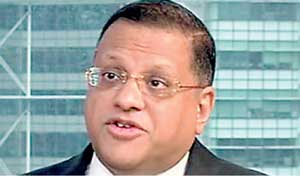Thursday Feb 19, 2026
Thursday Feb 19, 2026
Wednesday, 19 August 2015 00:48 - - {{hitsCtrl.values.hits}}
Sri Lanka has joined the small club of emerging Asian nations openly asking the Federal Reserve to raise rates sooner rather than later to end the excruciating wait-and-see their financial markets are enduring.
Speaking to CNBC in an exclusive interview, Central Bank of Sri Lanka Governor  Arjuna Mahendran said he preferred the US central bank to increase its short-term lending rate by September rather than postpone the long-awaited move.
Arjuna Mahendran said he preferred the US central bank to increase its short-term lending rate by September rather than postpone the long-awaited move.
“As I see it, this will be a one-off [interest rate] hike and thereafter, I expect the Fed to remain on hold for several months. From that perspective, I would prefer [the rate hike] to be done by September and we could resume normalcy,” the 56-year-old said.
Sri Lanka is not alone; Indonesia also urged the Fed to hurry up with the liftoff in interest rates, according to a report by Reuters earlier this month. The country’s Coordinating Minister for Economics, SofyanDjalil, told the newswire that uncertainty over when the world’s most influential central bank would tighten its monetary policy has created downward pressure on the Indonesian rupiah, which is now undervalued.
Speculation over when the Fed will raise rates for the first time in nine years has dominated the market agenda ever since the central bank ended its historic quantitative easing program in October 2014. However, a rise in near-zero interest rates in the US is widely feared due to the possibility it will spark another exodus of funds from emerging markets, which took a battering in 2013 when former Fed Chairman Ben Bernanke first broached the possibility of tapering the bond-buying program.
According to a Reuters poll released last Thursday, the Fed, now headed by Janet Yellen, could raise interest rates twice this year, with the first hike coming as early as next month amid improving economic fundamentals in the US. But an abrupt devaluation of the yuan by Chinese authorities last week has had some market watchers paring back their forecasts. Sri Lanka’s Central Bank and Government has made preparations ahead of the potential tightening in US monetary policy, with policymakers taking steps to reduce the amount of borrowing in US dollars, while growing the country’s international currency reserves. Buoyed by increasing remittances by overseas Sri Lankans, the country’s balance of payments was given a “clean bill of health” by the International Monetary Fund in April, according to Governor Mahendran.
“What we [have done] is to boost our reserves and in that respect we are fortunate [in that] our neighbour India has given us $1.5 billion of reserve support to ward off any speculative attacks on our currency,” he said, referring to the Reserve Bank of India’s (RBI) agreement in March to do a $1.5 billion currency swap with the Sri Lankan Central Bank.
“At the same time, we are very prudently reducing the [amount] of dollar borrowing given that the value of the dollar is surging up relentlessly. So we are trying to lay down the steps to protect ourselves in the event [of a US rate hike],” Mahendran added.
Apart from a looming US interest rate rise, growth concerns about a slowdown in China – Sri Lanka’s largest trading partner in the Asian region – and domestic political instability have added to the volatility in the country’s financial markets.
Last week the Sri Lanka’s rupee lost 0.3% of its value against the US dollar, as capital outflows gathered pace amid market volatility induced by the yuan’s sharp slide and as investors looked ahead to the parliamentary elections on Monday. However, the Central Bank Governor says there was “nothing to be worried about.”
“We’ve obviously seen a bit of capital moving out of the Sri Lankan markets, such as foreign holders of our bonds to [some] extent [while] equities have seen a bit of profit-taking in recent weeks and months. Whether that is attributable to the volatility in the yuan or the elections we are having in Sri Lanka, is debatable but I would say the amount that left has been fairly minimal, so it’s nothing really to worry about,” Mahendran told CNBC. On Monday, Sri Lankans voted in a general election in which former President Mahinda Rajapaksa was trying to stage a political comeback. The 69-year-old who was voted out of office in January after a decade-long rule, stood as a parliamentary candidate for the United People’s Freedom Alliance (UPFA) and is seeking a return to power as prime minister. With no exit polls available, final results of the election will be due early Tuesday. According to Reuters, the turnout was estimated by observers at 65 percent, below that of the historic presidential poll earlier this year, but higher than five years ago.
The benchmark Colombo Stock Exchange All Share Index finished at its highest level in seven months in a shortened trading session Monday on hopes that political stability would return after the parliamentary elections and help boost investor sentiment, reported Reuters citing local brokers.